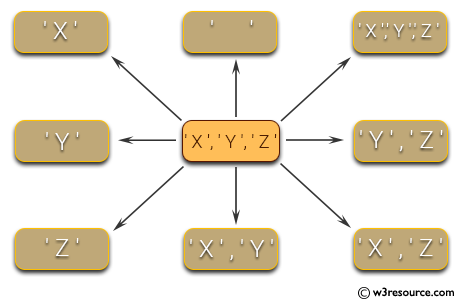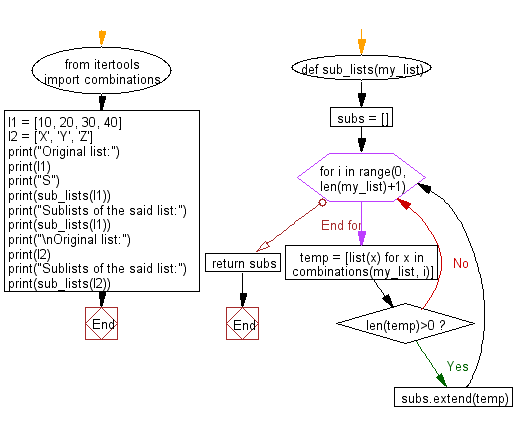Python: Generate all sublists of a list
Generate All Sublists
Write a Python program to generate all sublists of a list.

Sample Solution:
Python Code:
# Import the 'combinations' function from the 'itertools' module, which is used to generate combinations
from itertools import combinations
# Define a function named 'sub_lists' that generates all possible sublists of a given list 'my_list'
def sub_lists(my_list):
subs = [] # Create an empty list 'subs' to store the sublists
# Iterate through the range of numbers from 0 to the length of 'my_list' + 1
for i in range(0, len(my_list) + 1):
# Use the 'combinations' function to generate all combinations of 'my_list' of length 'i'
temp = [list(x) for x in combinations(my_list, i)]
# Check if 'temp' contains any elements; if so, extend the 'subs' list with the generated sublists
if len(temp) > 0:
subs.extend(temp)
return subs # Return the list of generated sublists
# Define a list 'l1' containing numeric elements and another list 'l2' containing string elements
l1 = [10, 20, 30, 40]
l2 = ['X', 'Y', 'Z']
# Print the original list 'l1'
print("Original list:")
print(l1)
# Print a label indicating the start of sublist generation for 'l1'
print("Sublists of the said list:")
# Call the 'sub_lists' function with 'l1' and print the sublists of 'l1'
print(sub_lists(l1))
# Print a newline for separation
print("\nOriginal list:")
print(l2)
# Print a label indicating the start of sublist generation for 'l2'
print("Sublists of the said list:")
# Call the 'sub_lists' function with 'l2' and print the sublists of 'l2'
print(sub_lists(l2))
Sample Output:
Original list: [10, 20, 30, 40] S [[], [10], [20], [30], [40], [10, 20], [10, 30], [10, 40], [20, 30], [20, 40], [30, 40], [10, 20, 30], [10, 20, 40], [10, 30, 40], [20, 30, 40], [10, 20, 30, 40]] Sublists of the said list: [[], [10], [20], [30], [40], [10, 20], [10, 30], [10, 40], [20, 30], [20, 40], [30, 40], [10, 20, 30], [10, 20, 40], [10, 30, 40], [20, 30, 40], [10, 20, 30, 40]] Original list: ['X', 'Y', 'Z'] Sublists of the said list: [[], ['X'], ['Y'], ['Z'], ['X', 'Y'], ['X', 'Z'], ['Y', 'Z'], ['X', 'Y', 'Z']]
Flowchart:

For more Practice: Solve these Related Problems:
- Write a Python program to generate all possible contiguous sublists of a list.
- Write a Python program to generate all sublists of a given length from a list.
- Write a Python program to generate all non-empty sublists of a list using recursion.
- Write a Python program to generate all sublists of a list while preserving relative order.
Go to:
Previous: Write a Python program to check whether a list contains a sublist.
Next: Write a Python program using Sieve of Eratosthenes method for computing primes upto a specified number.
Python Code Editor:
What is the difficulty level of this exercise?
Test your Programming skills with w3resource's quiz.
